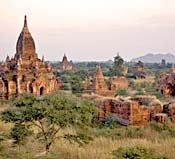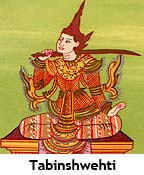The first known city-states emerged in central Burma around the 2nd century BC by Pyu tribes who initiated trade with India and brought Buddhism to the region.
 Repeated attacks by the Kingdom of Nanzhao during the 8th century AD forced the decline of the Pyu culture. By the late 9th century, Nanzhao had founded a small settlement at Pagan (Bagan).
Repeated attacks by the Kingdom of Nanzhao during the 8th century AD forced the decline of the Pyu culture. By the late 9th century, Nanzhao had founded a small settlement at Pagan (Bagan). The Pagan civilization flourished throughout the 11th century, and ultimately absorbed the surrounding settlements, forming the Pagan Empire. Together with the Khmer Empire, the Pagan Empire was one of the main powers of Southeast Asia at the time, and subsequently the Burmese language and culture dominated the land.
However, the Pagans were no match for Mongol invaders, and after repeated invasions the empire collapsed in 1287.
The Mongols migrated out of the region shortly after the fall of the Pagans, leaving several smaller kingdoms, which sparked an era of wars and switching alliances.
In 1364 the successor state of Ava was founded in central Burma, in an attempt to reassemble the Pagan Empire. Unfortunately, while it was successful in reigning the Toungoo and peripheral Shan states, it failed to conquer the remaining states, and was eventually overrun by Toungoo forces in 1555.
 Tabinshwehti, Toungoo's overly ambitious king, conquered a vast amount of Southeast Asia throughout the 16th century, becoming the area's largest empire in history. However, after the death of Tabinshwehti's successor, Bayinnaung, the empire began to unravel, before completely dissolving in 1599.
Tabinshwehti, Toungoo's overly ambitious king, conquered a vast amount of Southeast Asia throughout the 16th century, becoming the area's largest empire in history. However, after the death of Tabinshwehti's successor, Bayinnaung, the empire began to unravel, before completely dissolving in 1599. Through the next two centuries, Burma fell under the ruling of numerous small kingdoms, was conquered by the British in the 19th century and incorporated into its Indian EmpireIn the colonial era, Rangoon was named capital of Burma, becoming an important port between Calcutta and Singapore.
Civil unrest prevailed through theBritish rule, and violent protests were carried out for decades.
During the Second World War, Burma became a major battleground, completely devastating the country, and causing the British administration to break down; thus allowing Burma their chance at gaining independence in 1948.
Since 1962, the military has controlled the country, even failing to turn over the governmental power to the opposition party that won a landslide victory in the 1990 general election.
On November 6, 2005, the administrative capital was moved from the city of Rangoon to the newly built city of Nay Pyi Taw.
 The country of Burma is replete with natural resources, but growth and progress are stifled by strict government controls and serious financial mismanagement.
The country of Burma is replete with natural resources, but growth and progress are stifled by strict government controls and serious financial mismanagement. In 2008, a "discipline-flourishing democracy" was promised, and a new constitution was drafted. General elections were held in 2010, and the military-backed Union Solidarity and Development Party was victorious.
A series of reforms moving toward liberal democracy are in the making, however the motives of all reforms are still debated and uncertainties continue to exist within the country.
The beautiful and mysterious city of Rangoon is the principal port, and tourists are attracted by the city's large number of ancient golden pagodas (monuments to Buddha) that still stand.
No comments:
Post a Comment